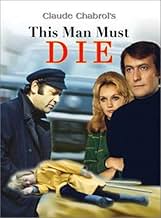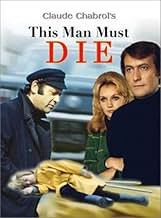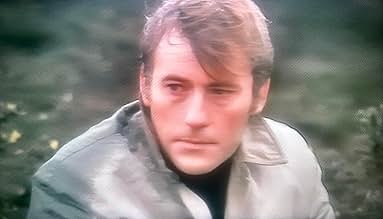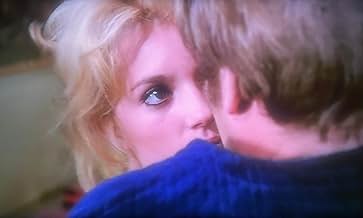CALIFICACIÓN DE IMDb
7.6/10
5.1 k
TU CALIFICACIÓN
Un hombre se adentra en la vida de una actriz a la que cree de algún modo responsable por la muerte de su hijo.Un hombre se adentra en la vida de una actriz a la que cree de algún modo responsable por la muerte de su hijo.Un hombre se adentra en la vida de una actriz a la que cree de algún modo responsable por la muerte de su hijo.
- Dirección
- Guionistas
- Elenco
- Premios
- 1 premio ganado en total
- Dirección
- Guionistas
- Todo el elenco y el equipo
- Producción, taquilla y más en IMDbPro
Opiniones destacadas
A particularly difficult film to comment upon without giving away vital plot elements but it has to be one of the director's finest. It has the suspense he can work so well, it has the the French bourgeoisie at their worst, it has gentle eroticism and sudden brutality.
We also have here superb story telling combined with high emotional content and a continuous switchback ride of twist and turns, even though we, seemingly,have the whole plot of the film placed openly before us within minutes of the opening credits.
Meticulously directed, there is not a superfluous scene, nor even a superfluous gesture. It is pure riveting cinema from start to finish
Great performances, great camera-work, great Chabrol.
We also have here superb story telling combined with high emotional content and a continuous switchback ride of twist and turns, even though we, seemingly,have the whole plot of the film placed openly before us within minutes of the opening credits.
Meticulously directed, there is not a superfluous scene, nor even a superfluous gesture. It is pure riveting cinema from start to finish
Great performances, great camera-work, great Chabrol.
In taking a slight cue from Alfred Hitchcock (one of Chabrol's heroes), but going another step further, This Man Must Die follows a logical turn of events for a single father who's son is run over in a hit and run by some cruel man in a fast car. In Hitchcock's hands this might be led by elegant stars, have even moments of scathing wit. But Chabrol's vision is a little darker, more that is seething under this surface, with the bourgeois as much of the commonplace as just the backdrop for the theater of revenge about to take place. But like the old master, Chabrol takes a twist with the material: as the father, Charles Thenier, going by an alias as a writer of children's books, gets more than acquainted with a woman who is the sister-in-law of the killer, gets to know the family more, and gets to know slimy, shrewd businessman and big-time garage owner Paul Decourt more, he's not really the only one out for his head.
As Chabrol goes further, it becomes a tale of Greek tragedy, or some variation on it. Paul's son, Philippe (a character as played by jean Yanne as if almost out of Bresson), hates his father with a passion, as his father has no respect for or tries to encourage his son with what he's got going on at school (perhaps conventionally, every scene with the father and son is a tense and violent outburst from father towards innocent son). One might think a collaboration might happen between the secretive, diary-writing Charles and the kind but frustrated kid, but this too isn't that simple. Chabrol also takes a smart tactic with that diary of Charles's; it could be just a narrative gimmick, and at times it feels as just that (maybe one of the film's only drawbacks, if only only on), but it does start to probe into a mindset that is one-track, and not without some reason in the genre sense. We're pitted on Charles's side, as he sneaks his way into Helen's heart, and then through her sometimes nice and other times (i.e. Paul's mother) savage in their verbal brutality.
But this same diary works as a something of a step-up from a psychological MacGuffin. Chabrol twists around with plot into motivation, and he pulls it off with his shooting and editing style, which applies just small, precise touches of the good old French New Wave into the proceedings (the occasional jump-cut, as any filmmaker knows, can't hurt under the right circumstances). What Chabrol's brilliant achievement is to transcend the trappings of a revenge film and to explore what the nature of malevolence brings past a simple crime- certainly these bastards have families, if they have the capacity to clear up their crimes with such skill like an owner of a hugely profitable auto-body/garage- and at the same time put a human angle into a plot that requires it. The actors do what they can (the man playing Charles, who I have not seen in other films, is very good in the lead, as is in his own right the man playing Paul Decourt, adding some layers to this rotten being), and despite some clunky scenes that do have to deal with the plot, there's some wit thrown in under the surface ("It's not a needle in a haystack, more like a needle in a box of needles,").
If This Man Must Die isn't a great film, and I'm not sure it is, it is at least a very successful example of finding some of the cracks in a revenge mystery, of adding that superlative mix of character into plot, and seeing what makes things like a diary, or a slip off a cliff, or an ambiguous ending, tick.
As Chabrol goes further, it becomes a tale of Greek tragedy, or some variation on it. Paul's son, Philippe (a character as played by jean Yanne as if almost out of Bresson), hates his father with a passion, as his father has no respect for or tries to encourage his son with what he's got going on at school (perhaps conventionally, every scene with the father and son is a tense and violent outburst from father towards innocent son). One might think a collaboration might happen between the secretive, diary-writing Charles and the kind but frustrated kid, but this too isn't that simple. Chabrol also takes a smart tactic with that diary of Charles's; it could be just a narrative gimmick, and at times it feels as just that (maybe one of the film's only drawbacks, if only only on), but it does start to probe into a mindset that is one-track, and not without some reason in the genre sense. We're pitted on Charles's side, as he sneaks his way into Helen's heart, and then through her sometimes nice and other times (i.e. Paul's mother) savage in their verbal brutality.
But this same diary works as a something of a step-up from a psychological MacGuffin. Chabrol twists around with plot into motivation, and he pulls it off with his shooting and editing style, which applies just small, precise touches of the good old French New Wave into the proceedings (the occasional jump-cut, as any filmmaker knows, can't hurt under the right circumstances). What Chabrol's brilliant achievement is to transcend the trappings of a revenge film and to explore what the nature of malevolence brings past a simple crime- certainly these bastards have families, if they have the capacity to clear up their crimes with such skill like an owner of a hugely profitable auto-body/garage- and at the same time put a human angle into a plot that requires it. The actors do what they can (the man playing Charles, who I have not seen in other films, is very good in the lead, as is in his own right the man playing Paul Decourt, adding some layers to this rotten being), and despite some clunky scenes that do have to deal with the plot, there's some wit thrown in under the surface ("It's not a needle in a haystack, more like a needle in a box of needles,").
If This Man Must Die isn't a great film, and I'm not sure it is, it is at least a very successful example of finding some of the cracks in a revenge mystery, of adding that superlative mix of character into plot, and seeing what makes things like a diary, or a slip off a cliff, or an ambiguous ending, tick.
"Que la bête meure " belongs to Chabrol's golden era.This is one of his most brilliant achievements,and,nevertheless,he would do even better with the next one"le boucher",with,again,Jean Yanne,an actor,who,before ,was featured in generally mediocre commercial movies.In his two films with Chabrol ,Yanne will show skills we would never thought of.Both characters,in "que la bete..." and "le boucher" are monsters;but monsters of different kinds:in "le boucher",Yanne is pitiful,moving,a product of the war (in Algeria?)On the other hand,in "Que la bête...",he's a hateful vulgar petit bourgeois brute.Compare the way Chabrol introduces his characters:in "le boucher",Popaul appears in the first scene,the wedding banquet,and he seems a good guy.In "Que la bête...",Chabrol does not show his face during Duchaussoy's son death on the road.When finally,the father discovers the reckless driver's house,we meet first his scared family circle.Then we hear his formidable voice.All happens like in a fairy tale:Tom Thumb entering the ogre's den.Perhaps Chabrol's most terrifying character, he holds up to ridicule his wife's attempt at poetry and he cannot understand his son ,a frail,sensitive,and clever teenager. The plot will take shape quickly,and after this story of sound and fury,the last pictures brings the audience some relief.Note,in both films,"le boucher" and "Que la bête.." ,the presence of water in these last pictures.
Following a number of fairly mediocre efforts from the early to late sixties, Chabrol got right back on track with the excellent "Le Biches", and followed that film with "Que la bête meure", an intensely involving revenge drama with the emphasis on psychology and character over action and violence.
The film opens like any revenge thriller would (albeit probably better-shot and acted than most of them), with a child being killed in a hit and run and his father vowing to track down and kill the perpetrator. The tale slowly becomes more and more psychological, however, and ends up being a variation on a Greek tragedy, as others have noted. Chabrol is rarely content with following the expected routine (when he is his films can be dismal), and "Que la bête meure" is far from routine, as we end up spending more than an hour with the all the main characters in place and even together most of the time. The script is carefully written to avoid plot issues (outside of the contrived and silly first clue the main character gets, I can't think of any major issues I had with the script), and the dialogue is as deliberately orchestrated as Chabrol's direction is, building the suspense and drama gradually.
After the nearly continuous camera motion in "Les Biches", Chabrol takes a different approach to this film. It's less stylized and more natural, with the shot composition never feeling contrived as it sometimes did in Chabrol's immediately preceding effort, although there is some very good and very deliberate work around when we first meet the villain. Chabrol also uses close-ups to great effect, particularly in the scene late in the film with Paul and Charles on a sail boat.
What is striking about "Que la bête meure" is that while it deliberately builds suspense it also refuses to work as a thriller, and this is most clearly seen towards the end of the film when we get the standard twists but they're so subtle and low-key that one barely pays attention to them. The plot doesn't really matter here, the film is about much more, about the moral implications of revenge, about the nature of man, and it does well to apply these preoccupations to its characters so that we are never far removed from the emotions they are going through, in particular the main character Charles, played by Michel Duchaussoy.
After a string of disappointing features the last two years of the sixties saw two strong efforts from Claude Chabrol which helped keep him as relevant to cinema as he is. "Que la bête meure" is not a perfect film, and it may not even necessarily be a great film (although I think it qualifies), but it is engaging and enjoyable and far from empty. It leaves one thinking about it well after it has finished playing.
8.5/10
The film opens like any revenge thriller would (albeit probably better-shot and acted than most of them), with a child being killed in a hit and run and his father vowing to track down and kill the perpetrator. The tale slowly becomes more and more psychological, however, and ends up being a variation on a Greek tragedy, as others have noted. Chabrol is rarely content with following the expected routine (when he is his films can be dismal), and "Que la bête meure" is far from routine, as we end up spending more than an hour with the all the main characters in place and even together most of the time. The script is carefully written to avoid plot issues (outside of the contrived and silly first clue the main character gets, I can't think of any major issues I had with the script), and the dialogue is as deliberately orchestrated as Chabrol's direction is, building the suspense and drama gradually.
After the nearly continuous camera motion in "Les Biches", Chabrol takes a different approach to this film. It's less stylized and more natural, with the shot composition never feeling contrived as it sometimes did in Chabrol's immediately preceding effort, although there is some very good and very deliberate work around when we first meet the villain. Chabrol also uses close-ups to great effect, particularly in the scene late in the film with Paul and Charles on a sail boat.
What is striking about "Que la bête meure" is that while it deliberately builds suspense it also refuses to work as a thriller, and this is most clearly seen towards the end of the film when we get the standard twists but they're so subtle and low-key that one barely pays attention to them. The plot doesn't really matter here, the film is about much more, about the moral implications of revenge, about the nature of man, and it does well to apply these preoccupations to its characters so that we are never far removed from the emotions they are going through, in particular the main character Charles, played by Michel Duchaussoy.
After a string of disappointing features the last two years of the sixties saw two strong efforts from Claude Chabrol which helped keep him as relevant to cinema as he is. "Que la bête meure" is not a perfect film, and it may not even necessarily be a great film (although I think it qualifies), but it is engaging and enjoyable and far from empty. It leaves one thinking about it well after it has finished playing.
8.5/10
Claude Chabrol made a lot of films during his career, and while I've only really scratched the surface so far - I have to say that this one is right up there with his very best! Chabrol's films aren't thrillers in the same vein as those made by the likes of Alfred Hitchcock (in spite of the fact that he is often known as 'The French Hitchcock'); with Chabrol the thrills don't come from moments of suspense or tension, but from the interest generated in the lead characters and the situation put forward, and that was never truer than with this film - perhaps the most sombre revenge movie ever made! The film starts off with a young boy returning home from the beach. However, his stroll is interrupted when a car comes out of nowhere and runs him down. The boy's father, a man named Charles Thenier, is distraught following the accident and vows to track down the man who did it. His thirst for revenge is great, but his hatred towards the murderer is so immense that he decides, one he finds him, to befriend and lure him into a false sense of security before killing him...
Since there's not a great deal of excitement in the visceral sense, it may seem on the surface that This Man Must Die does not do its job as a thriller. However, this couldn't be further from the truth. Chabrol's film is brooding and intriguing throughout and has a great sense of realism in the way that the wronged father goes after the man who killed his son. It has to be said that the film somewhat hinges on coincidence, but this is actually addressed within the film itself and the events that take place are largely logical. Once again, Chabrol's production values are high and the film is incredibly beautiful and it bodes well with the sober tone of the movie. The acting is fantastic, with Michel Duchaussoy doing well in the lead role and receiving excellent feedback from the lovely Caroline Cellier and the brilliant Jean Yanne who steals every scene he's in as the villain of the piece. The film boils down to an excellent conclusion that both comes as something of a surprise and adds some Greek tragedy into the mix. Overall, this is another big success for the great French director and comes highly recommended!
Since there's not a great deal of excitement in the visceral sense, it may seem on the surface that This Man Must Die does not do its job as a thriller. However, this couldn't be further from the truth. Chabrol's film is brooding and intriguing throughout and has a great sense of realism in the way that the wronged father goes after the man who killed his son. It has to be said that the film somewhat hinges on coincidence, but this is actually addressed within the film itself and the events that take place are largely logical. Once again, Chabrol's production values are high and the film is incredibly beautiful and it bodes well with the sober tone of the movie. The acting is fantastic, with Michel Duchaussoy doing well in the lead role and receiving excellent feedback from the lovely Caroline Cellier and the brilliant Jean Yanne who steals every scene he's in as the villain of the piece. The film boils down to an excellent conclusion that both comes as something of a surprise and adds some Greek tragedy into the mix. Overall, this is another big success for the great French director and comes highly recommended!
¿Sabías que…?
- TriviaThis film is based on a British novel of the 1930s written by the poet C. Day Lewis (under the pseudonym "Nicholas Blake") and is one of several novels by him to feature as its hero the brilliant amateur sleuth Nigel Strangeways. This adaptation, in addition to moving the action to modern-day France, entirely leaves out this leading character (or any new French character equivalent to him).
- ErroresAt the beginning Paul is shifting several times although the Mustang has an automatic transmission.
- ConexionesFeatured in Le cinéma passe à table (2005)
- Bandas sonoras4 ernste Gesänge Op. 121
Music by Johannes Brahms (as Brahms)
Performed by Kathleen Ferrier (as Katleen Ferrier)
Disque DECCA ACL 306
Selecciones populares
Inicia sesión para calificar y agrega a la lista de videos para obtener recomendaciones personalizadas
- How long is This Man Must Die?Con tecnología de Alexa
Detalles
- Tiempo de ejecución1 hora 50 minutos
- Mezcla de sonido
- Relación de aspecto
- 1.66 : 1
Contribuir a esta página
Sugiere una edición o agrega el contenido que falta

Principales brechas de datos
By what name was Que la bête meure (1969) officially released in India in English?
Responda




























